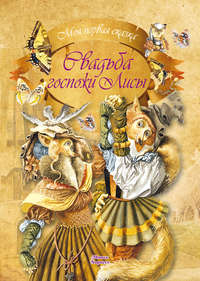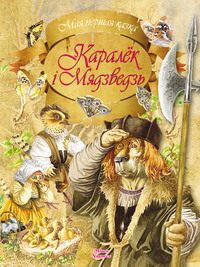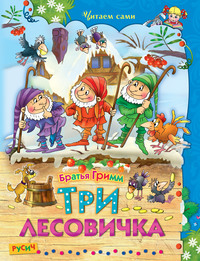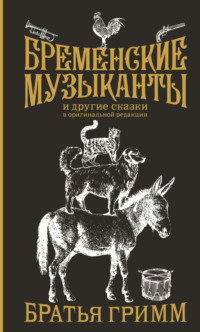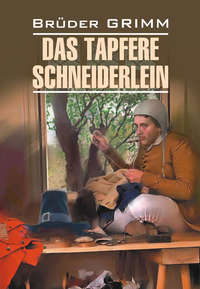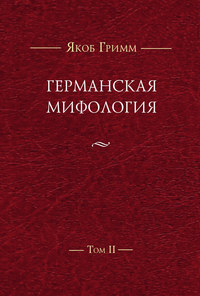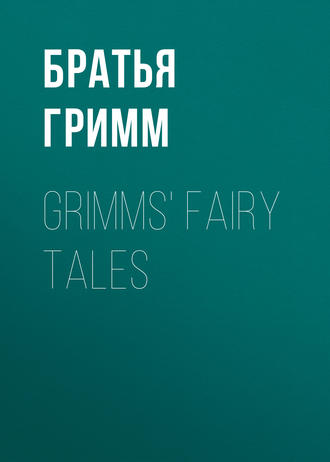 полная версия
полная версияGrimms' Fairy Tales
And now the old king gathered together his court, and asked all his kingdom to come and celebrate the wedding of his son and the princess. And young and old, noble and squire, gentle and simple, came at once on the summons; and among the rest came the friendly dwarf, with the sugarloaf hat, and a new scarlet cloak.
And the wedding was held, and the merry bells run. And all the good people they danced and they sung, And feasted and frolick’d I can’t tell how long.THE TWELVE HUNTSMEN
There was once a king’s son who had a bride whom he loved very much. And when he was sitting beside her and very happy, news came that his father lay sick unto death, and desired to see him once again before his end. Then he said to his beloved: ‘I must now go and leave you, I give you a ring as a remembrance of me. When I am king, I will return and fetch you.’ So he rode away, and when he reached his father, the latter was dangerously ill, and near his death. He said to him: ‘Dear son, I wished to see you once again before my end, promise me to marry as I wish,’ and he named a certain king’s daughter who was to be his wife. The son was in such trouble that he did not think what he was doing, and said: ‘Yes, dear father, your will shall be done,’ and thereupon the king shut his eyes, and died.
When therefore the son had been proclaimed king, and the time of mourning was over, he was forced to keep the promise which he had given his father, and caused the king’s daughter to be asked in marriage, and she was promised to him. His first betrothed heard of this, and fretted so much about his faithfulness that she nearly died. Then her father said to her: ‘Dearest child, why are you so sad? You shall have whatsoever you will.’ She thought for a moment and said: ‘Dear father, I wish for eleven girls exactly like myself in face, figure, and size.’ The father said: ‘If it be possible, your desire shall be fulfilled,’ and he caused a search to be made in his whole kingdom, until eleven young maidens were found who exactly resembled his daughter in face, figure, and size.
When they came to the king’s daughter, she had twelve suits of huntsmen’s clothes made, all alike, and the eleven maidens had to put on the huntsmen’s clothes, and she herself put on the twelfth suit. Thereupon she took her leave of her father, and rode away with them, and rode to the court of her former betrothed, whom she loved so dearly. Then she asked if he required any huntsmen, and if he would take all of them into his service. The king looked at her and did not know her, but as they were such handsome fellows, he said: ‘Yes,’ and that he would willingly take them, and now they were the king’s twelve huntsmen.
The king, however, had a lion which was a wondrous animal, for he knew all concealed and secret things. It came to pass that one evening he said to the king: ‘You think you have twelve huntsmen?’ ‘Yes,’ said the king, ‘they are twelve huntsmen.’ The lion continued: ‘You are mistaken, they are twelve girls.’ The king said: ‘That cannot be true! How will you prove that to me?’ ‘Oh, just let some peas be strewn in the ante-chamber,’ answered the lion, ‘and then you will soon see. Men have a firm step, and when they walk over peas none of them stir, but girls trip and skip, and drag their feet, and the peas roll about.’ The king was well pleased with the counsel, and caused the peas to be strewn.
There was, however, a servant of the king’s who favoured the huntsmen, and when he heard that they were going to be put to this test he went to them and repeated everything, and said: ‘The lion wants to make the king believe that you are girls.’ Then the king’s daughter thanked him, and said to her maidens: ‘Show some strength, and step firmly on the peas.’ So next morning when the king had the twelve huntsmen called before him, and they came into the ante-chamber where the peas were lying, they stepped so firmly on them, and had such a strong, sure walk, that not one of the peas either rolled or stirred. Then they went away again, and the king said to the lion: ‘You have lied to me, they walk just like men.’ The lion said: ‘They have been informed that they were going to be put to the test, and have assumed some strength. Just let twelve spinning-wheels be brought into the ante-chamber, and they will go to them and be pleased with them, and that is what no man would do.’ The king liked the advice, and had the spinning-wheels placed in the ante-chamber.
But the servant, who was well disposed to the huntsmen, went to them, and disclosed the project. So when they were alone the king’s daughter said to her eleven girls: ‘Show some constraint, and do not look round at the spinning-wheels.’ And next morning when the king had his twelve huntsmen summoned, they went through the ante-chamber, and never once looked at the spinning-wheels. Then the king again said to the lion: ‘You have deceived me, they are men, for they have not looked at the spinning-wheels.’ The lion replied: ‘They have restrained themselves.’ The king, however, would no longer believe the lion.
The twelve huntsmen always followed the king to the chase, and his liking for them continually increased. Now it came to pass that once when they were out hunting, news came that the king’s bride was approaching. When the true bride heard that, it hurt her so much that her heart was almost broken, and she fell fainting to the ground. The king thought something had happened to his dear huntsman, ran up to him, wanted to help him, and drew his glove off. Then he saw the ring which he had given to his first bride, and when he looked in her face he recognized her. Then his heart was so touched that he kissed her, and when she opened her eyes he said: ‘You are mine, and I am yours, and no one in the world can alter that.’ He sent a messenger to the other bride, and entreated her to return to her own kingdom, for he had a wife already, and someone who had just found an old key did not require a new one. Thereupon the wedding was celebrated, and the lion was again taken into favour, because, after all, he had told the truth.
THE KING OF THE GOLDEN MOUNTAIN
There was once a merchant who had only one child, a son, that was very young, and barely able to run alone. He had two richly laden ships then making a voyage upon the seas, in which he had embarked all his wealth, in the hope of making great gains, when the news came that both were lost. Thus from being a rich man he became all at once so very poor that nothing was left to him but one small plot of land; and there he often went in an evening to take his walk, and ease his mind of a little of his trouble.
One day, as he was roaming along in a brown study, thinking with no great comfort on what he had been and what he now was, and was like to be, all on a sudden there stood before him a little, rough-looking, black dwarf. ‘Prithee, friend, why so sorrowful?’ said he to the merchant; ‘what is it you take so deeply to heart?’ ‘If you would do me any good I would willingly tell you,’ said the merchant. ‘Who knows but I may?’ said the little man: ‘tell me what ails you, and perhaps you will find I may be of some use.’ Then the merchant told him how all his wealth was gone to the bottom of the sea, and how he had nothing left but that little plot of land. ‘Oh, trouble not yourself about that,’ said the dwarf; ‘only undertake to bring me here, twelve years hence, whatever meets you first on your going home, and I will give you as much as you please.’ The merchant thought this was no great thing to ask; that it would most likely be his dog or his cat, or something of that sort, but forgot his little boy Heinel; so he agreed to the bargain, and signed and sealed the bond to do what was asked of him.
But as he drew near home, his little boy was so glad to see him that he crept behind him, and laid fast hold of his legs, and looked up in his face and laughed. Then the father started, trembling with fear and horror, and saw what it was that he had bound himself to do; but as no gold was come, he made himself easy by thinking that it was only a joke that the dwarf was playing him, and that, at any rate, when the money came, he should see the bearer, and would not take it in.
About a month afterwards he went upstairs into a lumber-room to look for some old iron, that he might sell it and raise a little money; and there, instead of his iron, he saw a large pile of gold lying on the floor. At the sight of this he was overjoyed, and forgetting all about his son, went into trade again, and became a richer merchant than before.
Meantime little Heinel grew up, and as the end of the twelve years drew near the merchant began to call to mind his bond, and became very sad and thoughtful; so that care and sorrow were written upon his face. The boy one day asked what was the matter, but his father would not tell for some time; at last, however, he said that he had, without knowing it, sold him for gold to a little, ugly-looking, black dwarf, and that the twelve years were coming round when he must keep his word. Then Heinel said, ‘Father, give yourself very little trouble about that; I shall be too much for the little man.’
When the time came, the father and son went out together to the place agreed upon: and the son drew a circle on the ground, and set himself and his father in the middle of it. The little black dwarf soon came, and walked round and round about the circle, but could not find any way to get into it, and he either could not, or dared not, jump over it. At last the boy said to him. ‘Have you anything to say to us, my friend, or what do you want?’ Now Heinel had found a friend in a good fairy, that was fond of him, and had told him what to do; for this fairy knew what good luck was in store for him. ‘Have you brought me what you said you would?’ said the dwarf to the merchant. The old man held his tongue, but Heinel said again, ‘What do you want here?’ The dwarf said, ‘I come to talk with your father, not with you.’ ‘You have cheated and taken in my father,’ said the son; ‘pray give him up his bond at once.’ ‘Fair and softly,’ said the little old man; ‘right is right; I have paid my money, and your father has had it, and spent it; so be so good as to let me have what I paid it for.’ ‘You must have my consent to that first,’ said Heinel, ‘so please to step in here, and let us talk it over.’ The old man grinned, and showed his teeth, as if he should have been very glad to get into the circle if he could. Then at last, after a long talk, they came to terms. Heinel agreed that his father must give him up, and that so far the dwarf should have his way: but, on the other hand, the fairy had told Heinel what fortune was in store for him, if he followed his own course; and he did not choose to be given up to his hump-backed friend, who seemed so anxious for his company.
So, to make a sort of drawn battle of the matter, it was settled that Heinel should be put into an open boat, that lay on the sea-shore hard by; that the father should push him off with his own hand, and that he should thus be set adrift, and left to the bad or good luck of wind and weather. Then he took leave of his father, and set himself in the boat, but before it got far off a wave struck it, and it fell with one side low in the water, so the merchant thought that poor Heinel was lost, and went home very sorrowful, while the dwarf went his way, thinking that at any rate he had had his revenge.
The boat, however, did not sink, for the good fairy took care of her friend, and soon raised the boat up again, and it went safely on. The young man sat safe within, till at length it ran ashore upon an unknown land. As he jumped upon the shore he saw before him a beautiful castle but empty and dreary within, for it was enchanted. ‘Here,’ said he to himself, ‘must I find the prize the good fairy told me of.’ So he once more searched the whole palace through, till at last he found a white snake, lying coiled up on a cushion in one of the chambers.
Now the white snake was an enchanted princess; and she was very glad to see him, and said, ‘Are you at last come to set me free? Twelve long years have I waited here for the fairy to bring you hither as she promised, for you alone can save me. This night twelve men will come: their faces will be black, and they will be dressed in chain armour. They will ask what you do here, but give no answer; and let them do what they will – beat, whip, pinch, prick, or torment you – bear all; only speak not a word, and at twelve o’clock they must go away. The second night twelve others will come: and the third night twenty-four, who will even cut off your head; but at the twelfth hour of that night their power is gone, and I shall be free, and will come and bring you the Water of Life, and will wash you with it, and bring you back to life and health.’ And all came to pass as she had said; Heinel bore all, and spoke not a word; and the third night the princess came, and fell on his neck and kissed him. Joy and gladness burst forth throughout the castle, the wedding was celebrated, and he was crowned king of the Golden Mountain.
They lived together very happily, and the queen had a son. And thus eight years had passed over their heads, when the king thought of his father; and he began to long to see him once again. But the queen was against his going, and said, ‘I know well that misfortunes will come upon us if you go.’ However, he gave her no rest till she agreed. At his going away she gave him a wishing-ring, and said, ‘Take this ring, and put it on your finger; whatever you wish it will bring you; only promise never to make use of it to bring me hence to your father’s house.’ Then he said he would do what she asked, and put the ring on his finger, and wished himself near the town where his father lived.
Heinel found himself at the gates in a moment; but the guards would not let him go in, because he was so strangely clad. So he went up to a neighbouring hill, where a shepherd dwelt, and borrowed his old frock, and thus passed unknown into the town. When he came to his father’s house, he said he was his son; but the merchant would not believe him, and said he had had but one son, his poor Heinel, who he knew was long since dead: and as he was only dressed like a poor shepherd, he would not even give him anything to eat. The king, however, still vowed that he was his son, and said, ‘Is there no mark by which you would know me if I am really your son?’ ‘Yes,’ said his mother, ‘our Heinel had a mark like a raspberry on his right arm.’ Then he showed them the mark, and they knew that what he had said was true.
He next told them how he was king of the Golden Mountain, and was married to a princess, and had a son seven years old. But the merchant said, ‘that can never be true; he must be a fine king truly who travels about in a shepherd’s frock!’ At this the son was vexed; and forgetting his word, turned his ring, and wished for his queen and son. In an instant they stood before him; but the queen wept, and said he had broken his word, and bad luck would follow. He did all he could to soothe her, and she at last seemed to be appeased; but she was not so in truth, and was only thinking how she should punish him.
One day he took her to walk with him out of the town, and showed her the spot where the boat was set adrift upon the wide waters. Then he sat himself down, and said, ‘I am very much tired; sit by me, I will rest my head in your lap, and sleep a while.’ As soon as he had fallen asleep, however, she drew the ring from his finger, and crept softly away, and wished herself and her son at home in their kingdom. And when he awoke he found himself alone, and saw that the ring was gone from his finger. ‘I can never go back to my father’s house,’ said he; ‘they would say I am a sorcerer: I will journey forth into the world, till I come again to my kingdom.’
So saying he set out and travelled till he came to a hill, where three giants were sharing their father’s goods; and as they saw him pass they cried out and said, ‘Little men have sharp wits; he shall part the goods between us.’ Now there was a sword that cut off an enemy’s head whenever the wearer gave the words, ‘Heads off!’; a cloak that made the owner invisible, or gave him any form he pleased; and a pair of boots that carried the wearer wherever he wished. Heinel said they must first let him try these wonderful things, then he might know how to set a value upon them. Then they gave him the cloak, and he wished himself a fly, and in a moment he was a fly. ‘The cloak is very well,’ said he: ‘now give me the sword.’ ‘No,’ said they; ‘not unless you undertake not to say, “Heads off!” for if you do we are all dead men.’ So they gave it him, charging him to try it on a tree. He next asked for the boots also; and the moment he had all three in his power, he wished himself at the Golden Mountain; and there he was at once. So the giants were left behind with no goods to share or quarrel about.
As Heinel came near his castle he heard the sound of merry music; and the people around told him that his queen was about to marry another husband. Then he threw his cloak around him, and passed through the castle hall, and placed himself by the side of the queen, where no one saw him. But when anything to eat was put upon her plate, he took it away and ate it himself; and when a glass of wine was handed to her, he took it and drank it; and thus, though they kept on giving her meat and drink, her plate and cup were always empty.
Upon this, fear and remorse came over her, and she went into her chamber alone, and sat there weeping; and he followed her there. ‘Alas!’ said she to herself, ‘was I not once set free? Why then does this enchantment still seem to bind me?’
‘False and fickle one!’ said he. ‘One indeed came who set thee free, and he is now near thee again; but how have you used him? Ought he to have had such treatment from thee?’ Then he went out and sent away the company, and said the wedding was at an end, for that he was come back to the kingdom. But the princes, peers, and great men mocked at him. However, he would enter into no parley with them, but only asked them if they would go in peace or not. Then they turned upon him and tried to seize him; but he drew his sword. ‘Heads Off!’ cried he; and with the word the traitors’ heads fell before him, and Heinel was once more king of the Golden Mountain.
DOCTOR KNOWALL
There was once upon a time a poor peasant called Crabb, who drove with two oxen a load of wood to the town, and sold it to a doctor for two talers. When the money was being counted out to him, it so happened that the doctor was sitting at table, and when the peasant saw how well he ate and drank, his heart desired what he saw, and would willingly have been a doctor too. So he remained standing a while, and at length inquired if he too could not be a doctor. ‘Oh, yes,’ said the doctor, ‘that is soon managed.’ ‘What must I do?’ asked the peasant. ‘In the first place buy yourself an A B C book of the kind which has a cock on the frontispiece; in the second, turn your cart and your two oxen into money, and get yourself some clothes, and whatsoever else pertains to medicine; thirdly, have a sign painted for yourself with the words: “I am Doctor Knowall,” and have that nailed up above your house-door.’ The peasant did everything that he had been told to do. When he had doctored people awhile, but not long, a rich and great lord had some money stolen. Then he was told about Doctor Knowall who lived in such and such a village, and must know what had become of the money. So the lord had the horses harnessed to his carriage, drove out to the village, and asked Crabb if he were Doctor Knowall. Yes, he was, he said. Then he was to go with him and bring back the stolen money. ‘Oh, yes, but Grete, my wife, must go too.’ The lord was willing, and let both of them have a seat in the carriage, and they all drove away together. When they came to the nobleman’s castle, the table was spread, and Crabb was told to sit down and eat. ‘Yes, but my wife, Grete, too,’ said he, and he seated himself with her at the table. And when the first servant came with a dish of delicate fare, the peasant nudged his wife, and said: ‘Grete, that was the first,’ meaning that was the servant who brought the first dish. The servant, however, thought he intended by that to say: ‘That is the first thief,’ and as he actually was so, he was terrified, and said to his comrade outside: ‘The doctor knows all: we shall fare ill, he said I was the first.’ The second did not want to go in at all, but was forced. So when he went in with his dish, the peasant nudged his wife, and said: ‘Grete, that is the second.’ This servant was equally alarmed, and he got out as fast as he could. The third fared no better, for the peasant again said: ‘Grete, that is the third.’ The fourth had to carry in a dish that was covered, and the lord told the doctor that he was to show his skill, and guess what was beneath the cover. Actually, there were crabs. The doctor looked at the dish, had no idea what to say, and cried: ‘Ah, poor Crabb.’ When the lord heard that, he cried: ‘There! he knows it; he must also know who has the money!’
On this the servants looked terribly uneasy, and made a sign to the doctor that they wished him to step outside for a moment. When therefore he went out, all four of them confessed to him that they had stolen the money, and said that they would willingly restore it and give him a heavy sum into the bargain, if he would not denounce them, for if he did they would be hanged. They led him to the spot where the money was concealed. With this the doctor was satisfied, and returned to the hall, sat down to the table, and said: ‘My lord, now will I search in my book where the gold is hidden.’ The fifth servant, however, crept into the stove to hear if the doctor knew still more. But the doctor sat still and opened his A B C book, turned the pages backwards and forwards, and looked for the cock. As he could not find it immediately he said: ‘I know you are there, so you had better come out!’ Then the fellow in the stove thought that the doctor meant him, and full of terror, sprang out, crying: ‘That man knows everything!’ Then Doctor Knowall showed the lord where the money was, but did not say who had stolen it, and received from both sides much money in reward, and became a renowned man.
THE SEVEN RAVENS
There was once a man who had seven sons, and last of all one daughter. Although the little girl was very pretty, she was so weak and small that they thought she could not live; but they said she should at once be christened.
So the father sent one of his sons in haste to the spring to get some water, but the other six ran with him. Each wanted to be first at drawing the water, and so they were in such a hurry that all let their pitchers fall into the well, and they stood very foolishly looking at one another, and did not know what to do, for none dared go home. In the meantime the father was uneasy, and could not tell what made the young men stay so long. ‘Surely,’ said he, ‘the whole seven must have forgotten themselves over some game of play’; and when he had waited still longer and they yet did not come, he flew into a rage and wished them all turned into ravens. Scarcely had he spoken these words when he heard a croaking over his head, and looked up and saw seven ravens as black as coal flying round and round. Sorry as he was to see his wish so fulfilled, he did not know how what was done could be undone, and comforted himself as well as he could for the loss of his seven sons with his dear little daughter, who soon became stronger and every day more beautiful.
For a long time she did not know that she had ever had any brothers; for her father and mother took care not to speak of them before her: but one day by chance she heard the people about her speak of them. ‘Yes,’ said they, ‘she is beautiful indeed, but still ‘tis a pity that her brothers should have been lost for her sake.’ Then she was much grieved, and went to her father and mother, and asked if she had any brothers, and what had become of them. So they dared no longer hide the truth from her, but said it was the will of Heaven, and that her birth was only the innocent cause of it; but the little girl mourned sadly about it every day, and thought herself bound to do all she could to bring her brothers back; and she had neither rest nor ease, till at length one day she stole away, and set out into the wide world to find her brothers, wherever they might be, and free them, whatever it might cost her.


